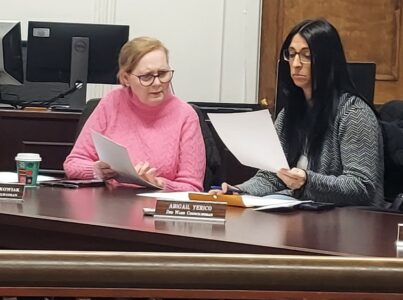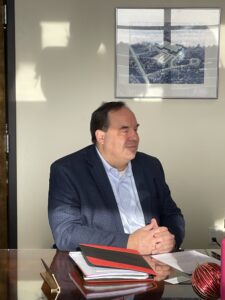Ripley truck stop project agreement to aid water system

Photo by David Prenatt Representatives from Love Travel Stops and Country Stores have been frequent visitors to the Ripley Town Council for the past two years.
RIPLEY — Ripley town council members passed a resolution at their regular meeting recently to enter into a Host Community Agreement with Love’s Travel Stops and Country Stores, which is intended to provide revenue for the water/sewer system.
Doug Bowen, town supervisor, introduced the resolution to council members, saying that he had approached the Love Corporation and asked them to deviate from their regular practice of paying direct taxes. Instead, Bowen said, a Host Community Agreement with the town will allow tax revenue to be channeled into the water/sewer projects.
“The reason is, through the straight property tax avenue, money can’t go to the sewer and water projects,” Bowen said. “In order for us to help out with the debt service cost of water/sewer expansion projects and much needed water/sewer plant upgrades, I asked Love’s if they would be willing to enter into a Host Community Agreement with the town.”
Bowen noted that state law dictates that sewer and water districts must pay for themselves.
“That makes for a real challenge when you have low population density,” he said. “I have been struggling to find a way to find additional funding for the water/sewer districts.”
Bowen said it is estimated that Love’s would pay $250,000 annually in straight property taxes which would be divided between the town, county and school.
Under the negotiated Host Community Agreement, Bowen said, it was agreed that Love’s would pay 85% of the total tax levy, of which an estimated $155,254 per year for 20 years would go to the town.
“It will go straight into the water/sewer districts,” Bowen said.
A Host Community Agreement is a contract between a developer and the local governing body or bodies of the host community, whereby the developer agrees to provide the community with certain benefits and mitigate specified impacts of the project. The HCA is between the developer and the town. However, the other part of this is the PILOT agreement with the county IDA. The PILOT agreement reduces the property tax cost to free up the revenue for the HCA, Bowen said.
Bowen further explained that Love’s does not typically request a PILOT program. However, in order for the Host Community Agreement to move forward, there must be a PILOT portion. The revenue from the PILOT program will be split between town, school and county.
Bowen went on to say that the first HCA payment will be in January of 023. The money from the agreement will be split five ways including reduction of debt service for sewer district #2 and water district #5, upgrades to the sewer plant, water plant upgrades, and money for capital projects.
Bowen said the agreement does not restrict how the funds are used in the water/sewer districts.
“It’s going to take some planning to put this together and make it work for the long term,” he said. “The challenge is to split the funds so that when the Host Community Agreement ends, we will not have to raise the per unit water/sewer debt service.”
During the public participation segment of the meeting, Ripley resident Melissa Fisher asked why the money will not all be used to pay down the debt service, thereby easing the burden on residents in sewer district 2 and water district 5.
“Why are you taking capital projects and adding them in here instead of further reducing the debt service?” she asked. “More money should be funneled into the debt service.”
Bowen responded that, in a sense, this will allow the whole community to share some of the burden.
“This is already pulling an estimated $40,000 away from the whole community for the water/sewer project,” he said.
Furthermore, Ripley will be requiring upgrades to its current water and sewer systems due to changes in DEC requirements, Bowen said.
“The town has an aging infrastructure that needs to be replaced and very little grant opportunity exists and when there are grants available there is a large town match required,” he said. “We are working with long term planning in mind, not just putting out immediate fires.”
In a related matter, the board also approved a modified site plan and special use permit requested by Love’s Travel Stops and Country Stores. The modification will remove one egress entrance into the travel center because the state Transportation Department determined it was too close to the highway. The other egress will be widened and also some parking spots will be added to the entire plan, Bowen said.
Love’s requested that the town supervisor sign the updated site plan, which is consistent with the town’s prior State Environmental Quality Review for the site. The Town Board passed a resolution to do so.
In other business, Bowen updated council members on the status of the South Ripley Solar Project. He noted that the planning board is currently updating the solar zoning law and battery energy system law. A special board meeting regarding these laws will be held February 18 at 7:30. he said.
James Muscato, counsel for the South Ripley Solar Project, said the company has only had a brief time to review the laws. Furthermore, he said, ConnectGen was not allowed to provide feedback at the planning board meetings.
Muscato went on to say that the laws being proposed by the planning board will impose restrictions far beyond state requirements on the project.
In response, planning board chair Shelly Spacht said Muscato’s claims are false.
“You were at every meeting and so was ConnectGen representative Isaac Phillips, and you were asked for input every time,” she said.
She also said the town’s attorney Ben Wisniewski has repeatedly asked Muscato not to speak in this format unless he is present.
In other matters, Town Historian John Hamels requested board approval to send a letter of intent and to subsequently to apply for a grant for historical markers through the William G. Pomeroy Foundation. The foundation will cover all costs of the markers, except for installation, Hamels said.
Hamels said he has spoken with Michelle Henry, county historian, who told him the foundation has placed more than 1,300 markers all across New York state.
“It surprised me, that when I drove around town, there are no historical markers,” Hamels said. “We have some really famous people that we should be honoring here. A lot of people don’t realize, there have been two U.S. Congressmen from the town.”
Hamels said he would like to start with a marker for BF Goodrich, and proceed from there.




